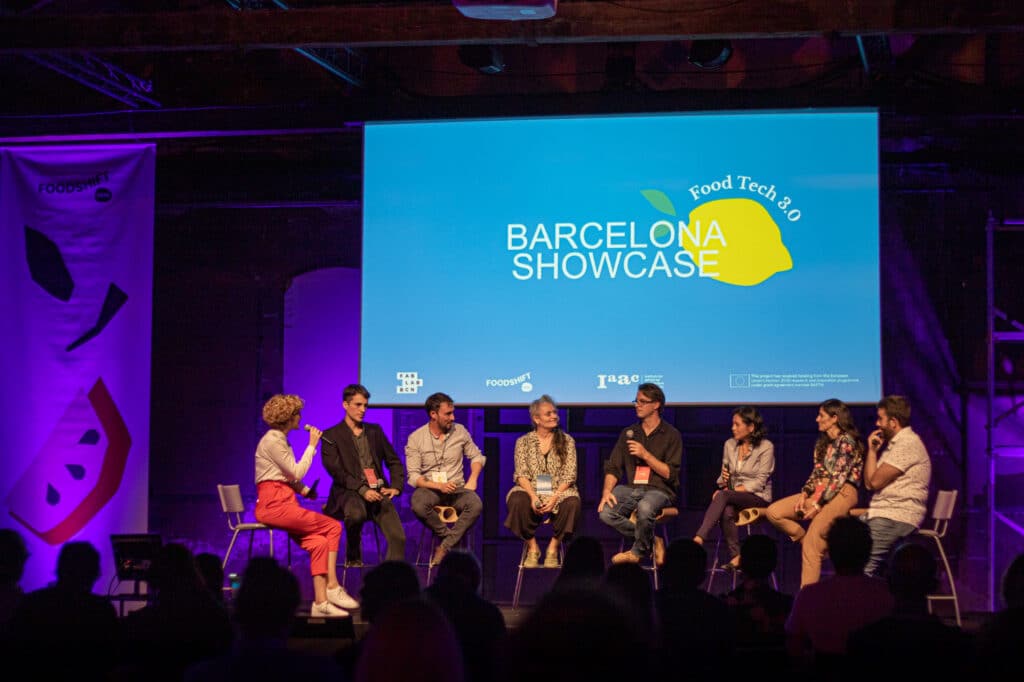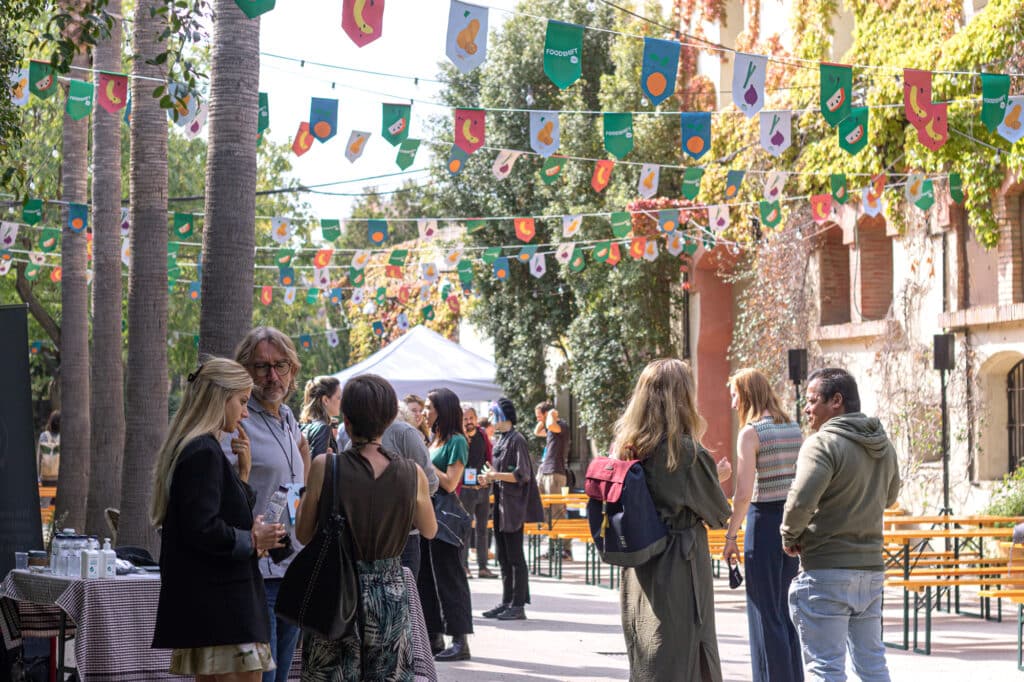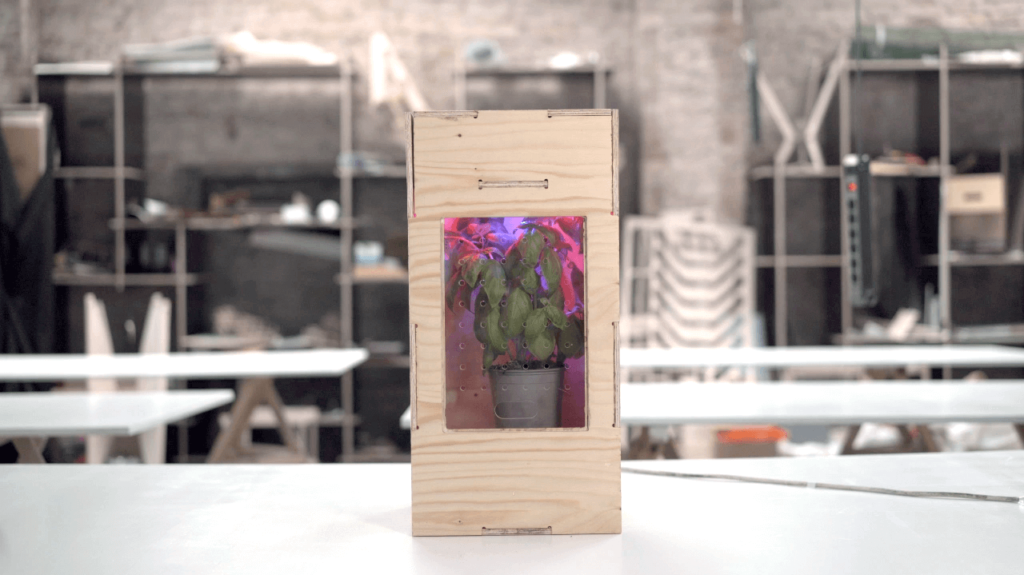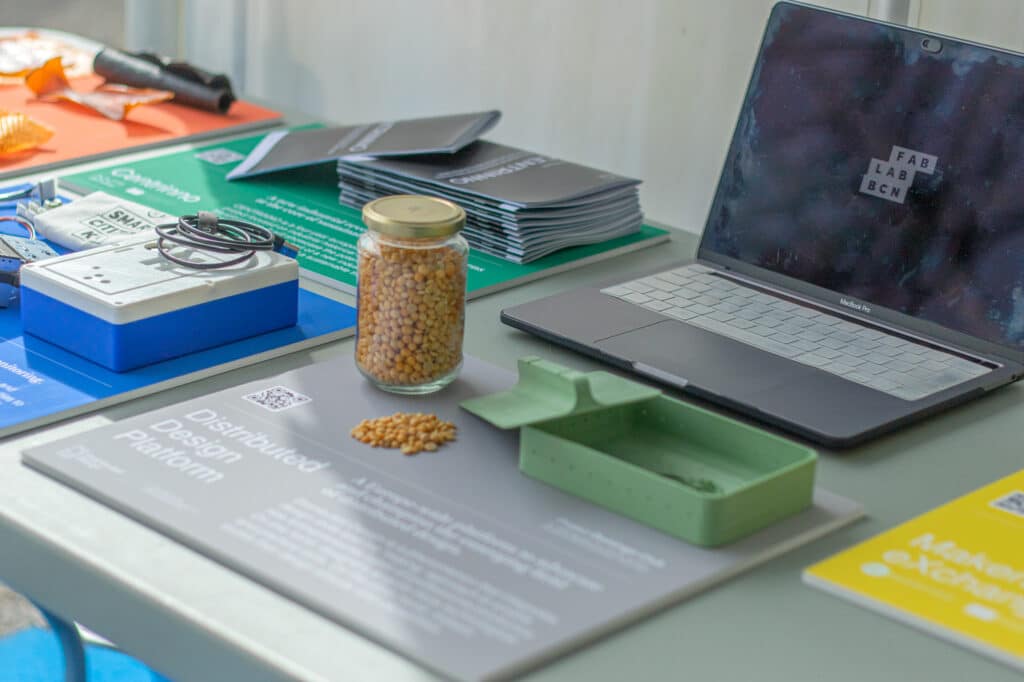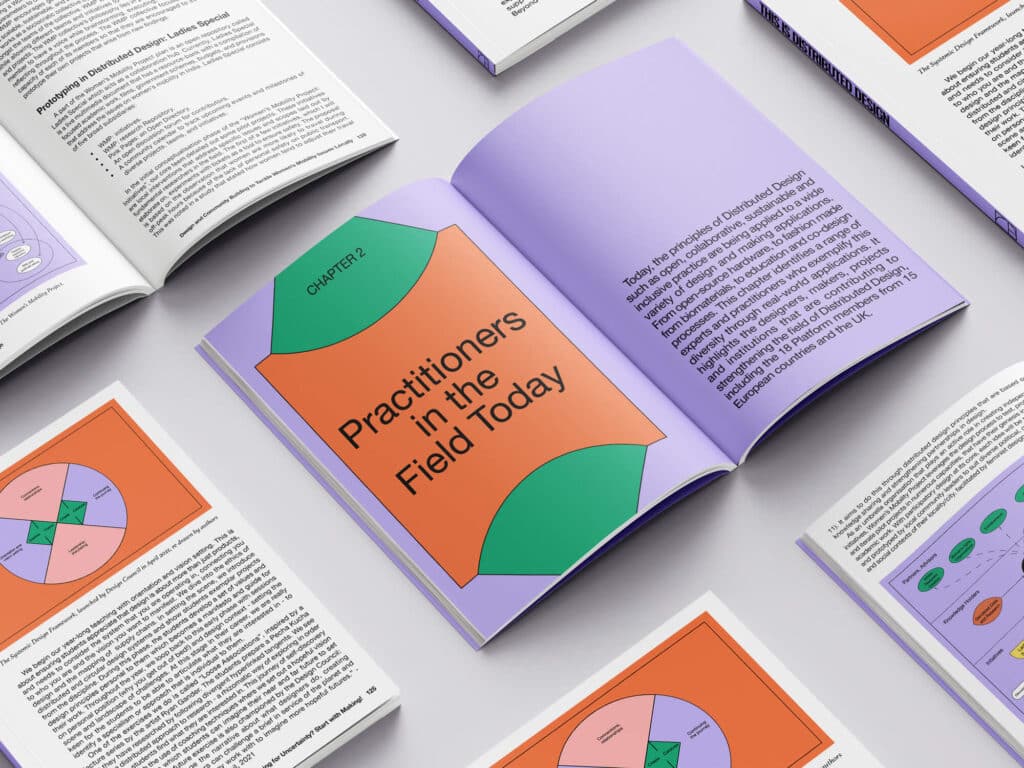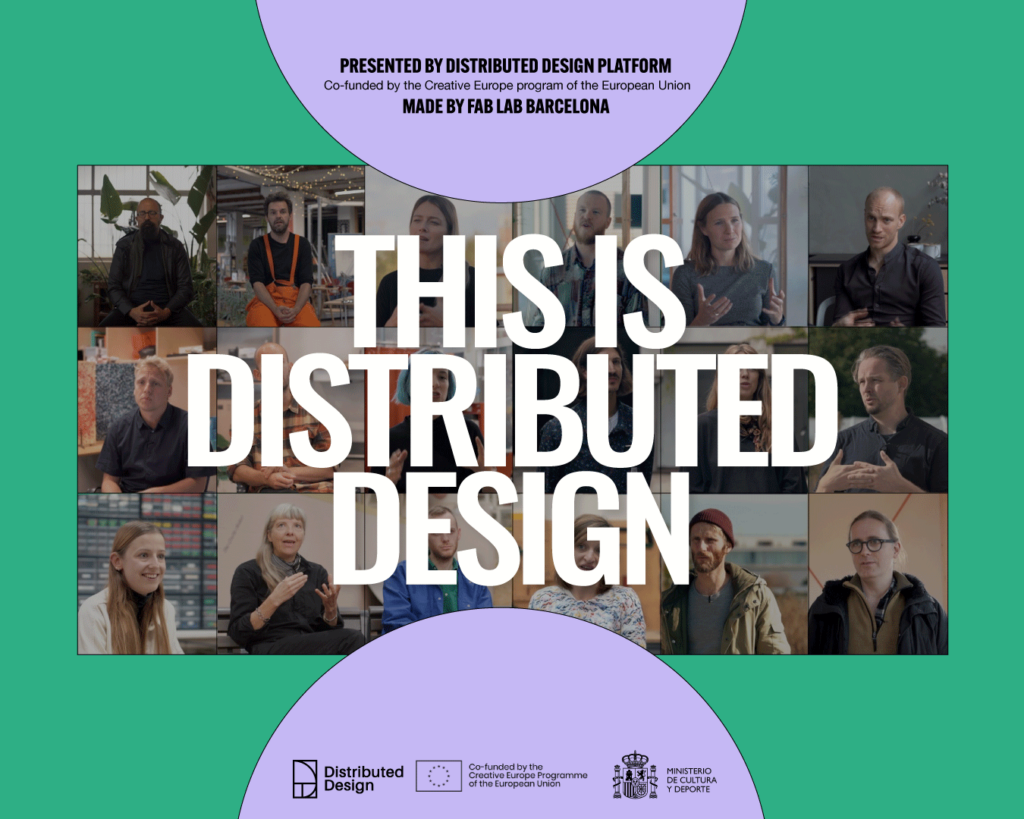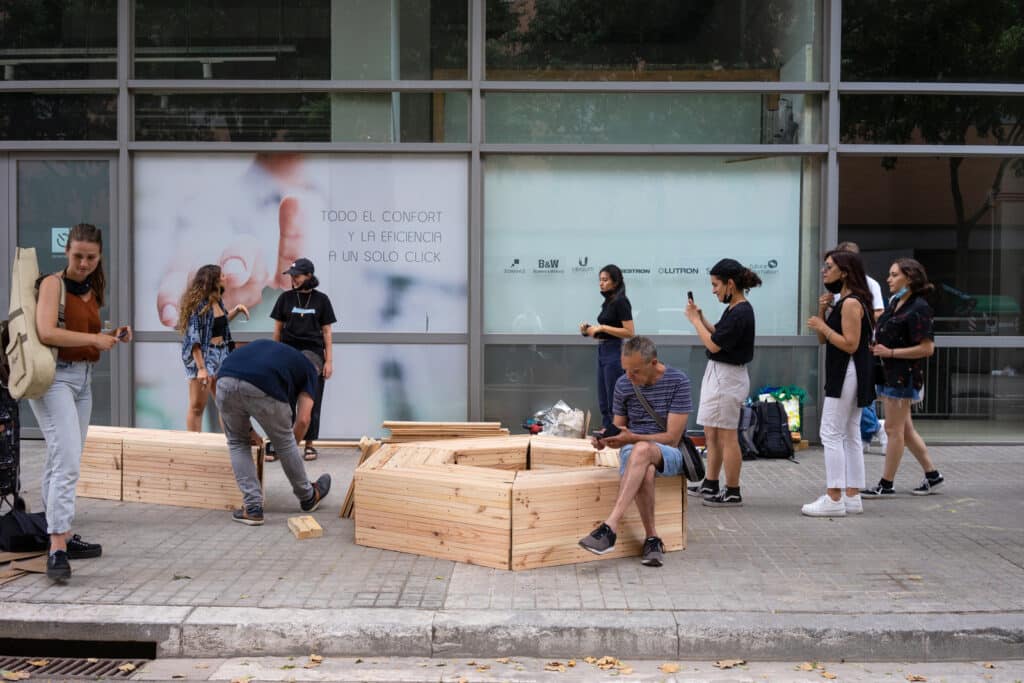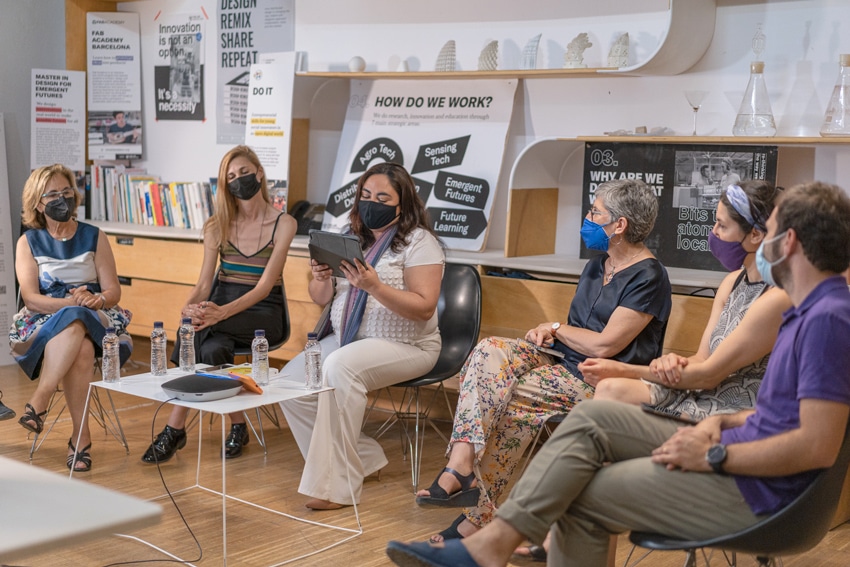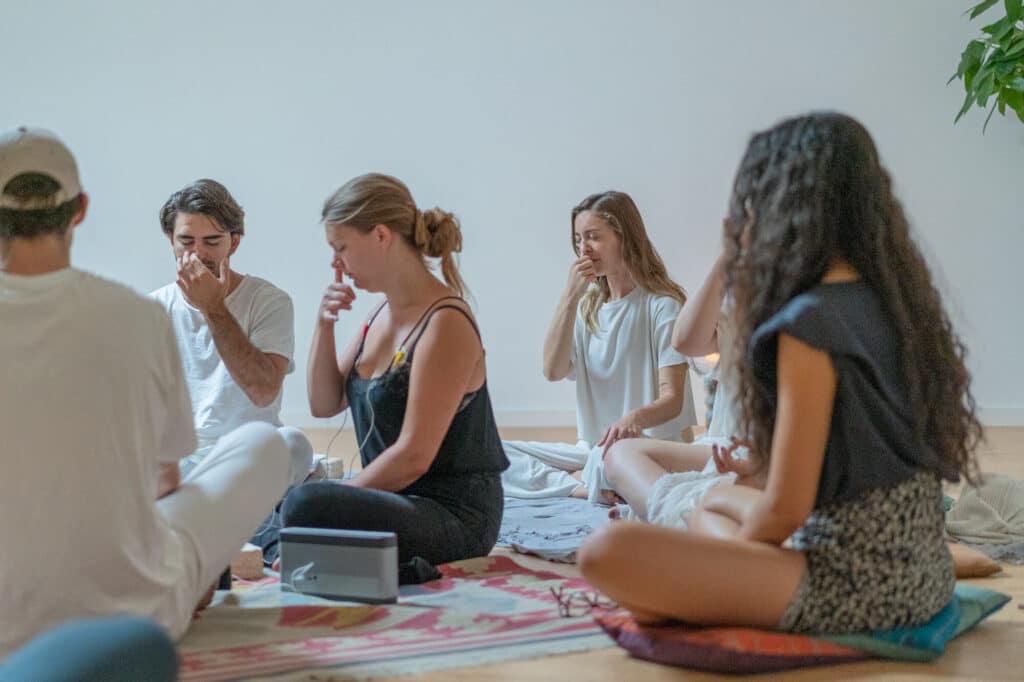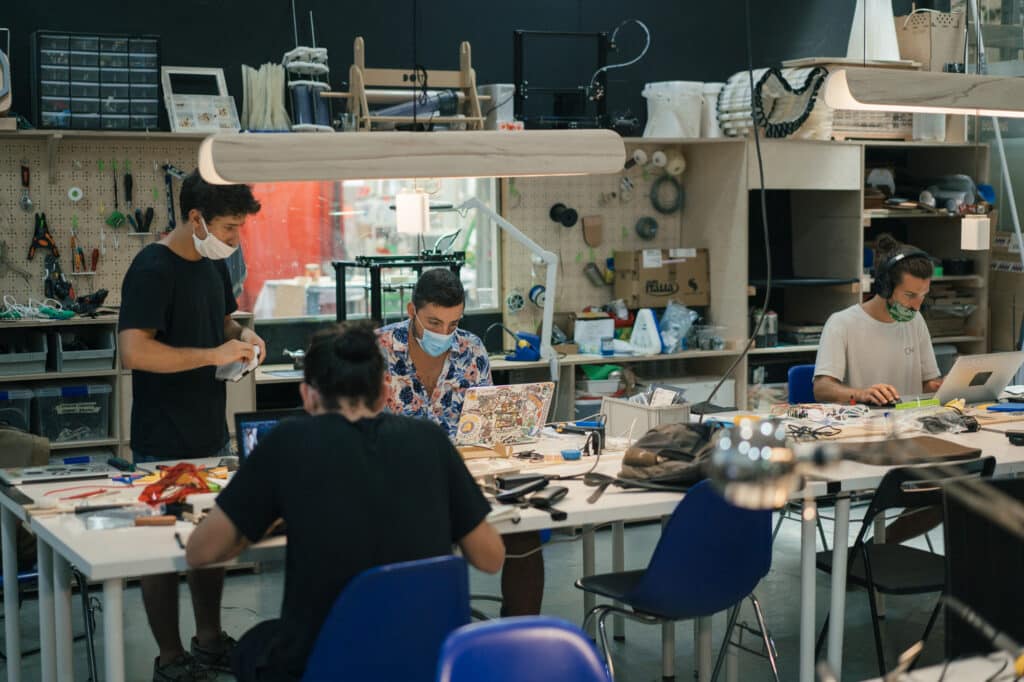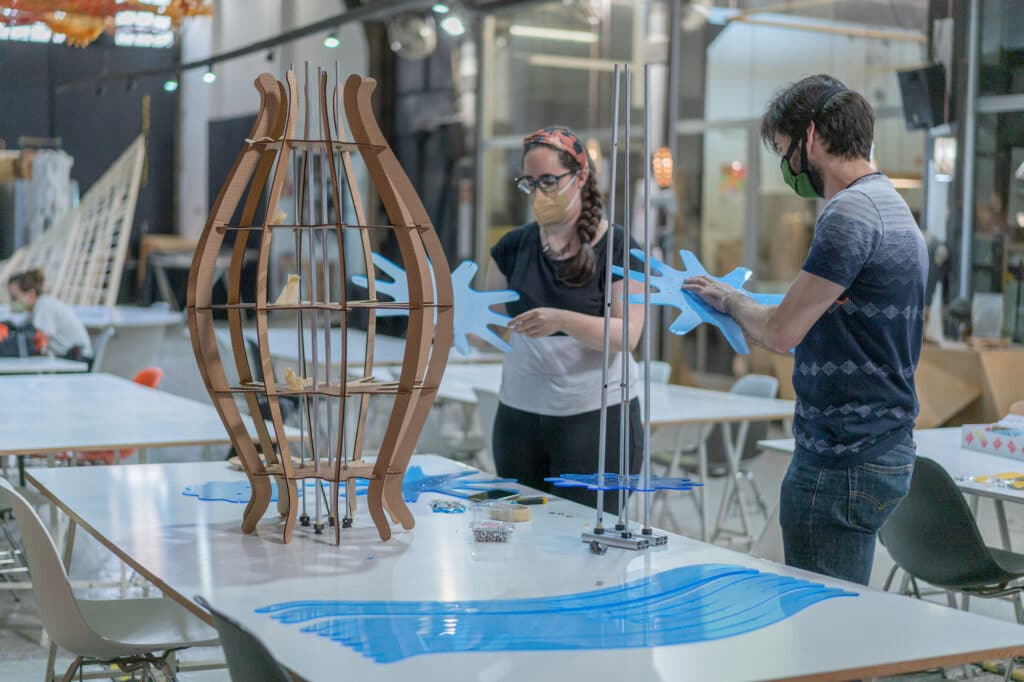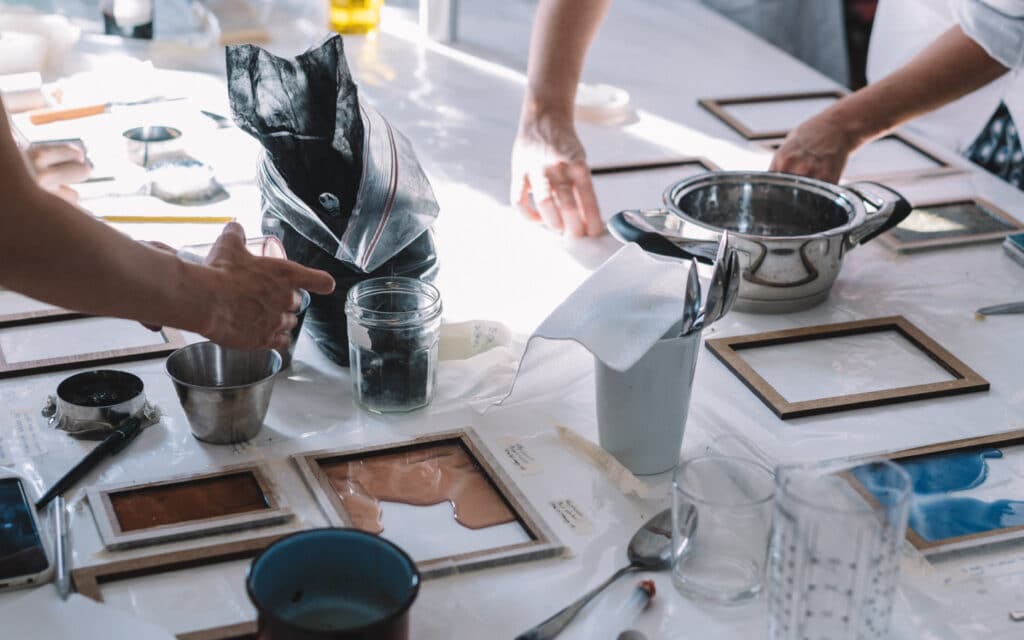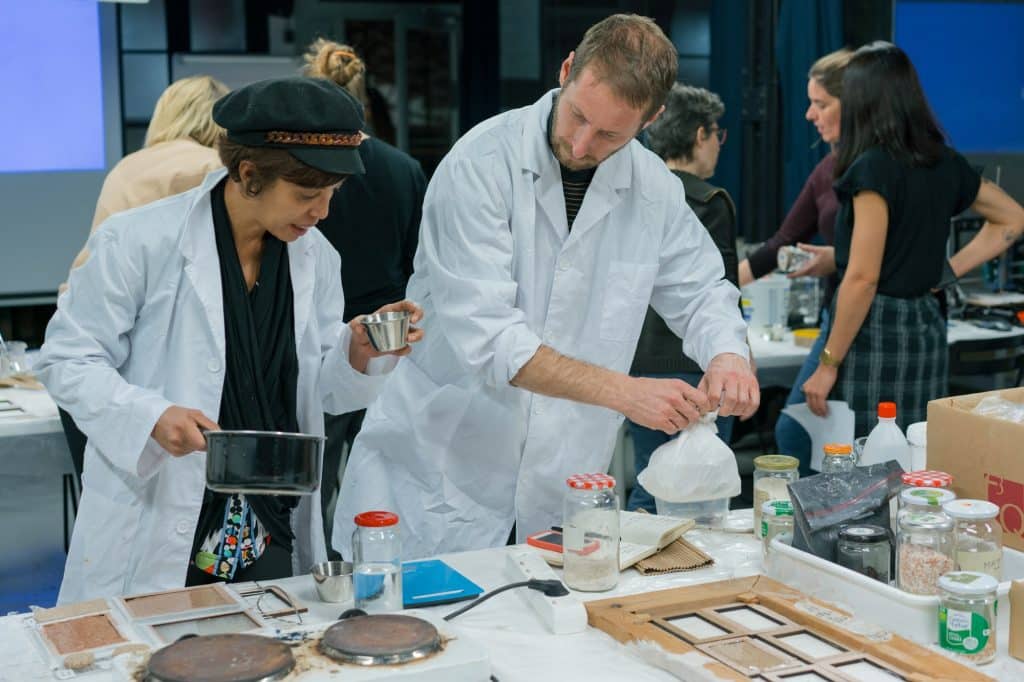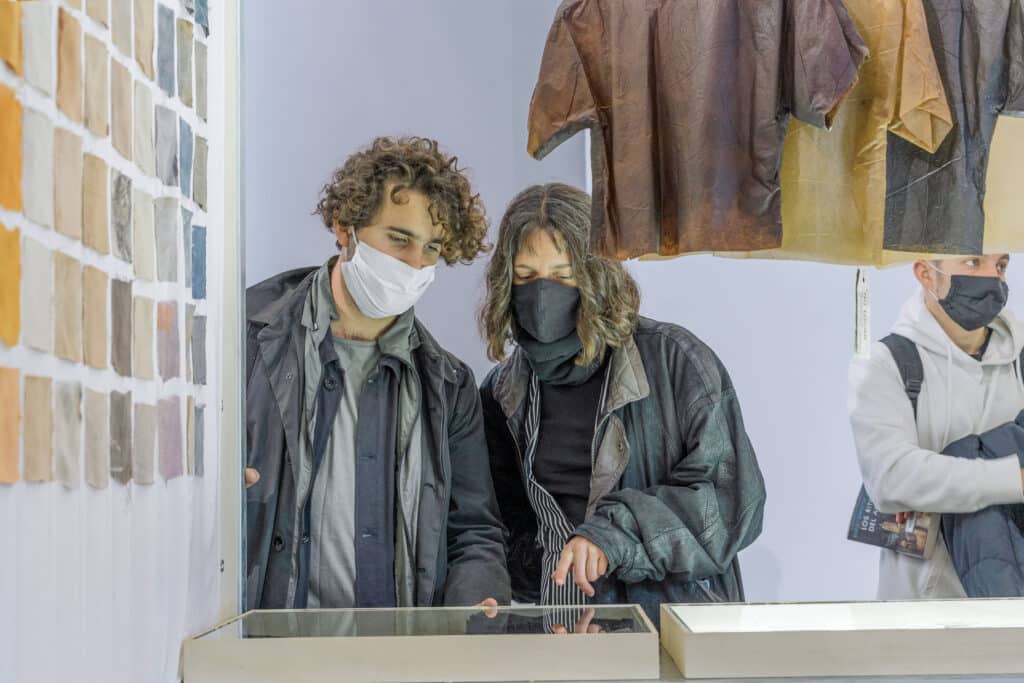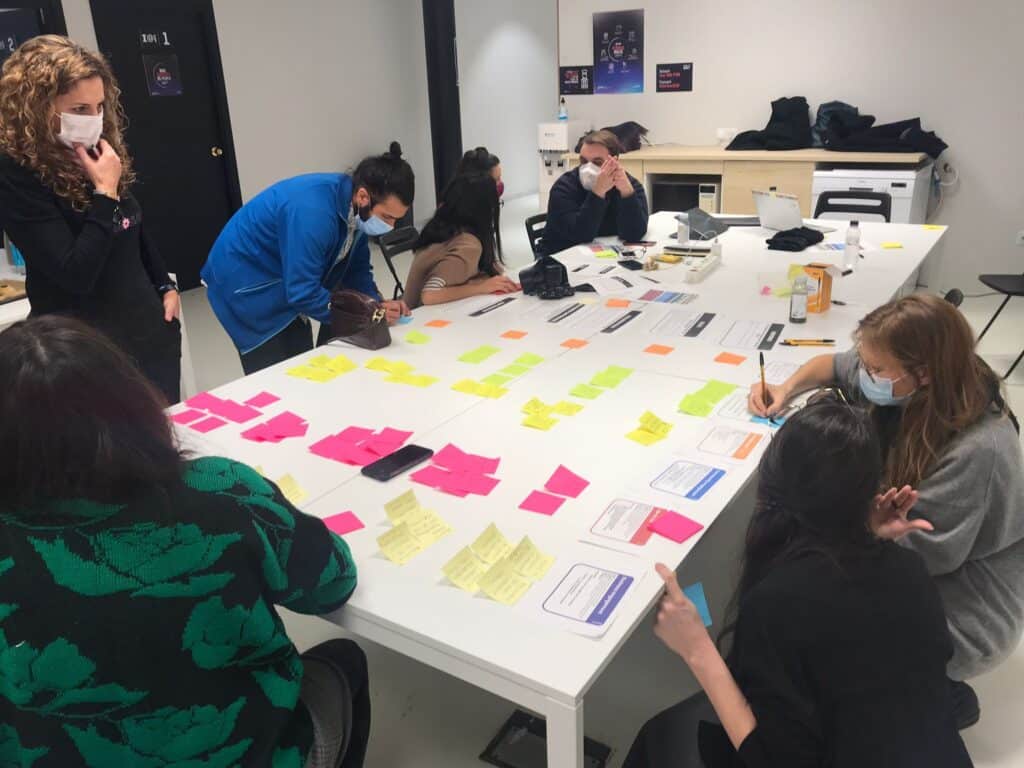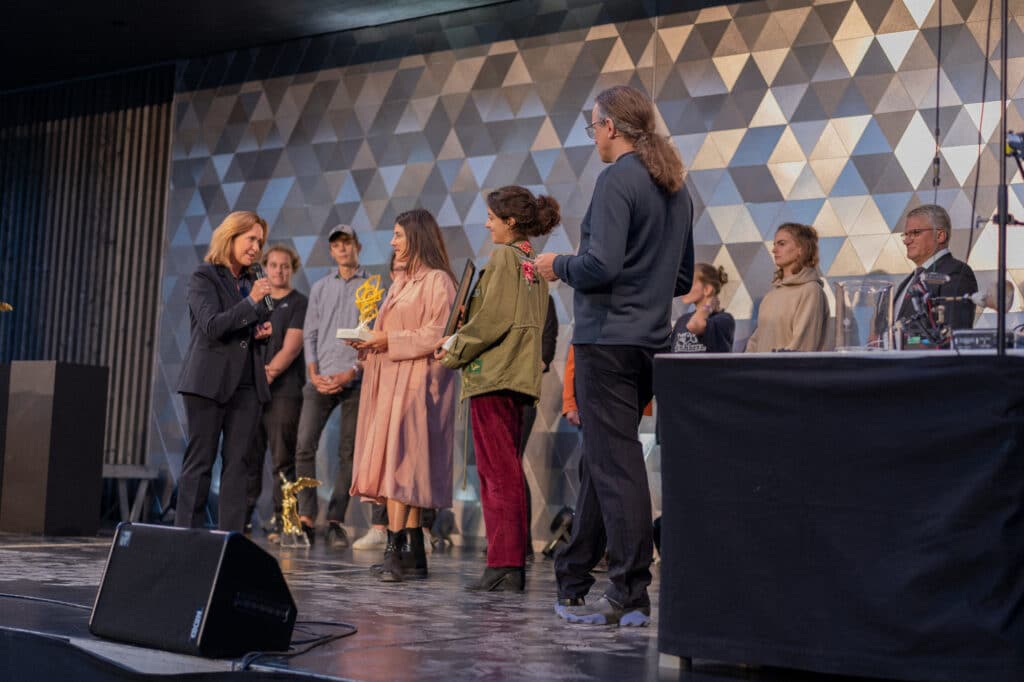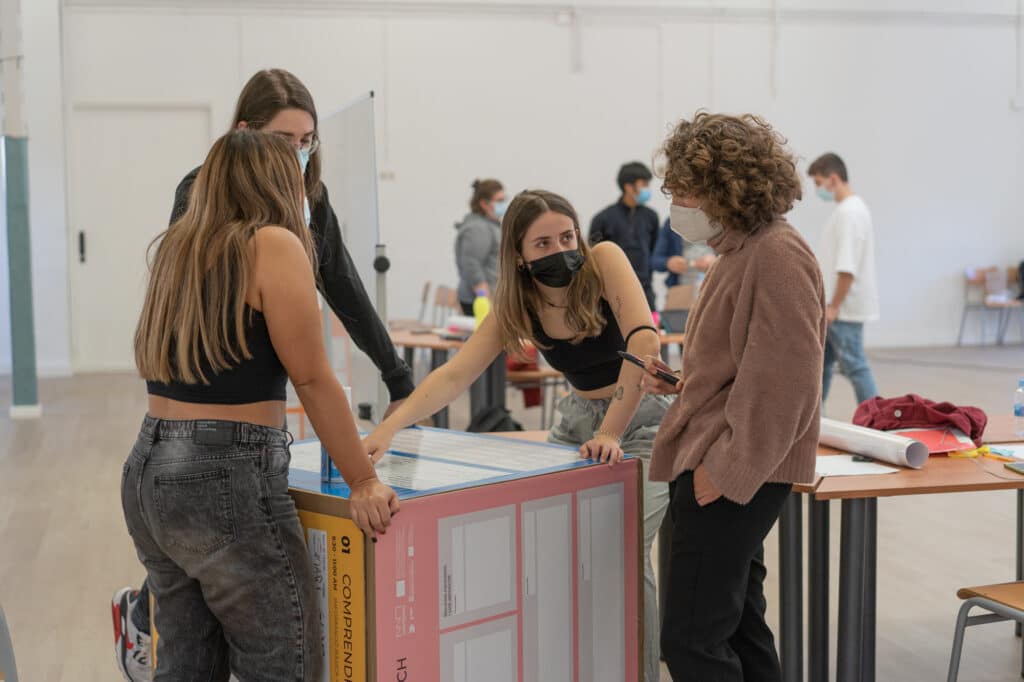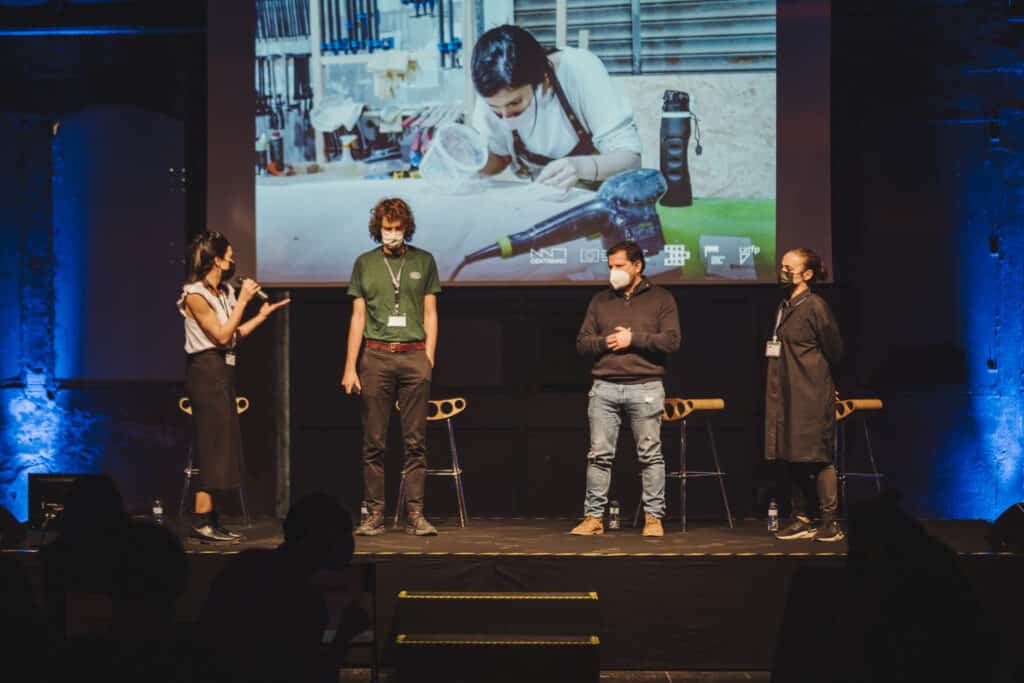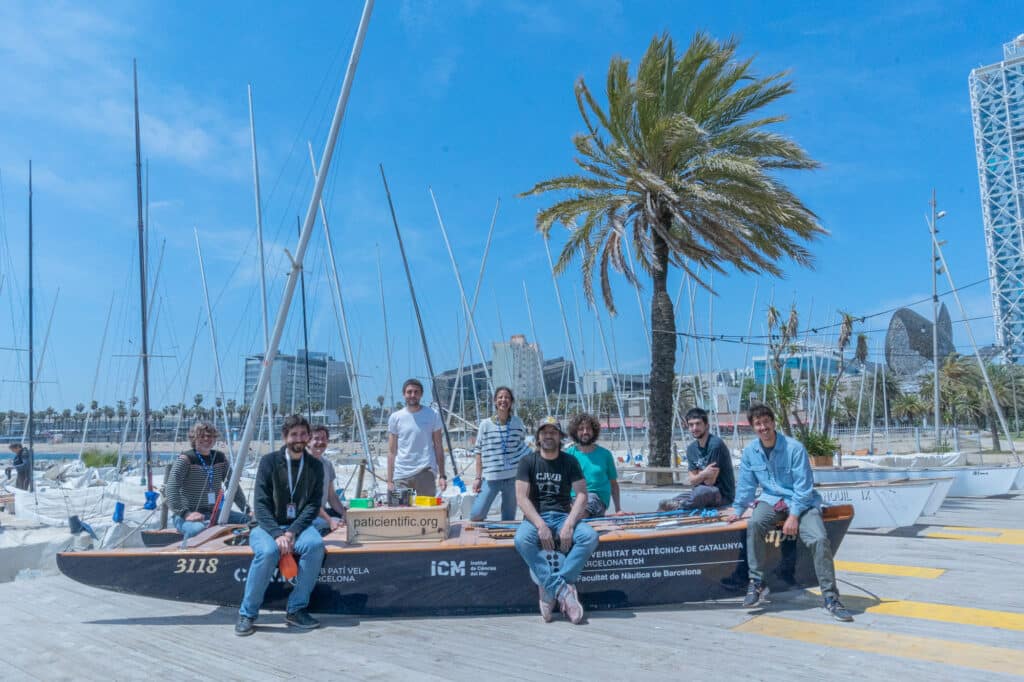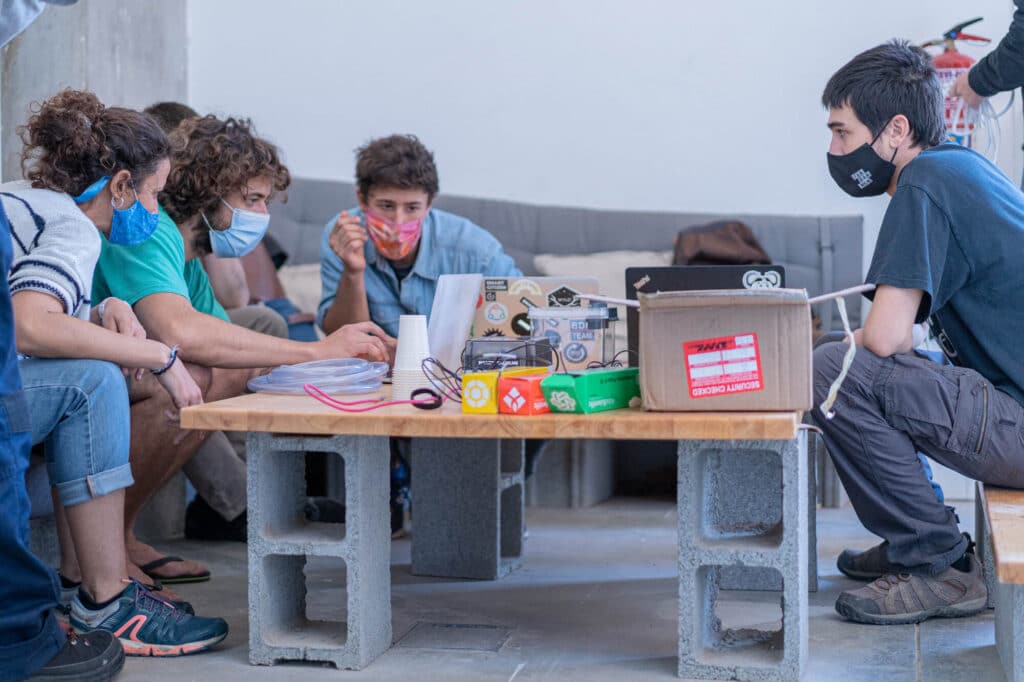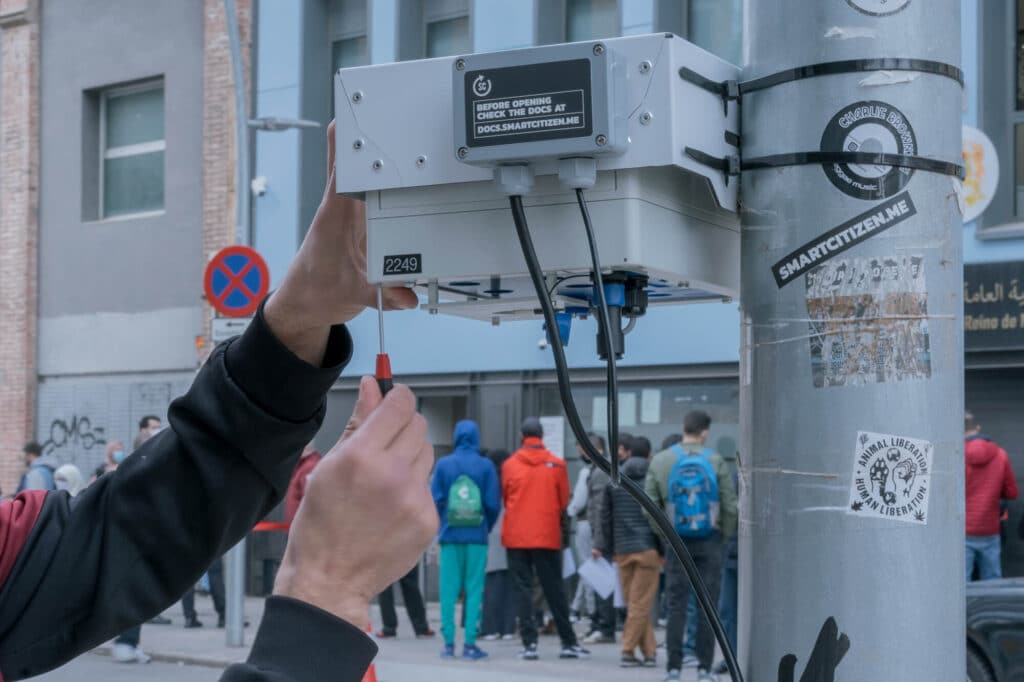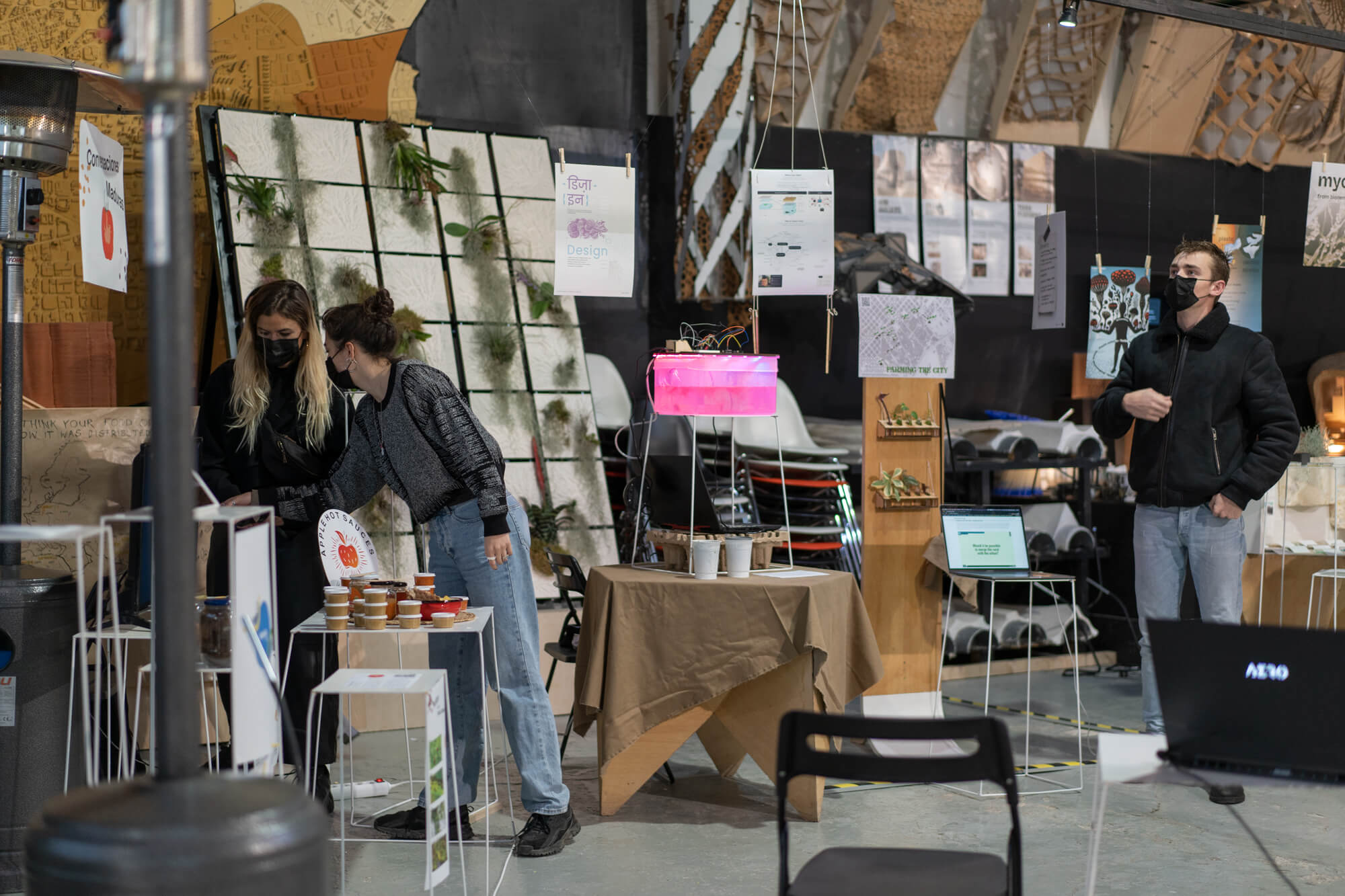
Looking back at 2021
A year in review at Fab Lab Barcelona
In times like these, following our mission to rethinking the way we live, work and play in cities is more relevant than ever. Despite 2021 being yet another exceptional year we have continued to look for new challenges and respond to opportunities. This year we divided our review into our strategic areas of expertise: Civic Ecology, Distributed Design,Emergent Futures, Future Learning, Materials and Textiles, Productive Cities and Sense Making – all the work we have done fits in at least one of the categories. Join us on a trip down memory lane!
🌱 Civic Ecology
Civic Ecology uses maker practices to engage with the natural world. Open-source hardware and tools can help us understand food, natural systems and bioregional processes through mapping, sensing or growing.
2021 in review
How can we shake up European diets to be more sustainable, inclusive and plant-based? Through the FoodSHIFT 2030 Accelerator program, Fab Lab Barcelona has been exploring the contribution open-tech projects can make to this paradigm shift. Ten local innovators took part in a one-year process to scale up the Social Readiness Level and Technology Readiness Level of their open-design food systems projects. From incubators for fermented foods to spirulina cultivation stations, the projects promoted community-centered open-design and tech responses to food systems innovation as part of the FoodSHIFT 2030 Horizon 2020 research project.
To contribute to the Europe-wide FoodSHIFT 2030 debate on food systems transitions, the Stakeholder Innovation Conference was hosted by Fab Lab Barcelona at Palo Alto in Poblenou during the Food Week as part of the Barcelona World Sustainable Food Capital for 2021 official programme. Streamed online to more than 700 viewers and presented live to an international and local audience of 150 people, the event promoted the work of the Project consortium of which Fab Lab Barcelona is a member and the FoodSHIFT Accelerator innovators.
In the ROMI project, we carried on the development and testing of open hardware tools to support small farms and agrology research.
Active projects and programs
🪑 Distributed Design
Distributed Design explores how maker practices contribute to the evolving practice of design and its role in shifting the global paradigm towards local production and global connectivity. It focuses on up-skilling, nurturing and bringing visibility to makers and designers who are working with the values of open, collaborative, ecosystemic and regenerative to shift design beyond the industrial paradigm.
2021 in review
‘This is Distributed Design’ book was edited and produced by Fab Lab Barcelona as the final book of four delivered annually by the Distributed Design Platform, (co-funded by the Creative Europe Program of the European Union and Coordinated by Fab Lab Barcelona at IAAC.) The book presents a state-of-the-art in an effort to inspire makers, designers and scholars alike, to prefigure viable design alternatives to the current paradigm which is designed for mass consumption. The Fab Lab Barcelona team also launched a Documentary by the same title, ‘This is Distributed Design’ featuring interviews from Distributed Design Platform members, talents and mentors.
‘Value-Based Certification for Distributed Design’ report was launched, summarising a four-year research period into the potential of a certification system for the values of Distributed Design. The report provides a synthesis of the research actions undertaken, including publications and conferences, and provides a roadmap with recommendations for the future implementation of a value-based certification for distributed design using smart contracting, DLT or NFT technologies.
The era of Distributed Learning and exchange is here. In 2021 Fab Lab Barcelona consolidated efforts to understand how makers and designers can undertake purposeful exchange at distance as part of their design development process as Distributed Designers. The ‘Hyper Local / Hyper Global’ makers exchange program facilitated by Fab Lab Barcelona (under the Makers eXchange program, pilot policy project, co-funded by the European Union) provided insights into the need to further develop the potential of ‘hybrid’ exchange mechanisms for makers and their social impact. The Crafts TECH Accelerator, hosted jointly with the Artesania Catalunya of the Consorci de Comerç, Artesania i Moda (CCAM) of the Generalitat de Catalunya, used the online context to transfer knowledge between digital designers and craftspeople, exploring the potential of ‘Maker to Market’ strategies: how to turn a project, an idea, or a design into a real product with room in the market.
Active projects and programs
Makers eXchange
Distributed Design Platform
🔮 Emergent Futures
Emergent Futures explores the next frontier of design, technology and innovation through small scale interventions in the present, and understanding the foundational elements of the past. We aim to incrementally make possible futures a reality by iterating alternative versions of the present in the real world.
2021 in review
Emergent Futures core activities are centered in the Master in Design for Emergent Futures. Thanks to the work of students and faculty, we have seen how the third edition of the program has consolidated the research and innovation methodologies developed in collaboration with Elisava School of Design and Engineering and our ecosystem of partners. In 2021 we have witnessed how students have taken the step forward to become active change-makers by challenging the traditional way of doing “things”. In this year’s edition of the Master, students organized an entire festival in the Poblenou neighborhood, which is our key experimental playground at the lab. The Emergent Futures Festival connected students’ projects with existing realities that live outside the lab and the classroom, allowing them to test in the real world their design interventions. The festival then becomes a bridge between the research and innovation activities of Fab Lab Barcelona, and the entire ecosystem and communities around it, and creating opportunities to learn in the wild how to design to enable futures that are possible today.
We are consolidating a body of knowledge that is aiming to innovate the way design education is delivered and approached. Emergent Futures is publishing its approach in different journals and magazines, some of them could be found at the Temes de Disseny by Elisava, and Making Futures journal. In these publications, we aim to share our design methodologies and how we create new learning environments to experiment in design education. We are convinced that education, in general, needs a deep revision, and we are doing it while delivering a unique learning environment in Barcelona, connected globally. Some of this work could be also seen in the EU-funded project Fuel4Design. One of our key design tools is the Atlas of the Weak Signals, developed in collaboration with Barcelona-based artist and curator Jose Luis de Vicente. With Jose Luis we have been able to develop a tool to navigate the uncertainty of our times, but also to use it to identify opportunities for design interventions in systems, communities, and territorial contexts. We are also bringing these methods and tools to the collaboration we develop with companies, supporting their teams to go through the radical transformations that are required to be part of a different planetary reality in our century.
Finally, we are thrilled to see the Emergent Futures Collective being born out of our alumni initiative. We have enabled the Emergent Futures Community platform with the idea to be taken over by agents of our ecosystem. We see the collective as a part of this effort, and we are committed to supporting the creation of collaborative spaces to foster initiatives that bring the Emergent Futures approach to the world, and that create opportunities for all its participants. The Emergent Futures Collective, in collaboration with IAAC and Elisava, was part of the Dutch Design Week, where they could engage directly with the event’s participants, and to provoke unique conversations about the futures we want to build, and not to be victims of.
Active projects and programs
Emergent Futures Festival
Emergent Futures Collective
Atlas of the Weak Signals
💭 Future Learning
Future Learning explores innovative educational models and hands-on opportunities to help communities develop resilience, critical thinking, research methods and teamwork skills. Its goal is to create contemporary learning environments and experiences to support growth, learning and sustained engagement. It supports educational communities that want to develop key skills and competencies to become agents of change. To ensure inclusive and equitable quality education and propose solutions to the global challenges we face
2021 in review
This year we have consolidated our proposal to accompany educational communities towards circularity with Remix the school distributed. We have scaled the project to a distributed mode for 10 schools, 20 teachers, 800 students. Furthermore, we have obtained the first privately funded research project TECLA, a 3-year project to accompany an educational community to have a systemic impact.
In 2021 we have diversified the content of the fabacademy program into two distinct educational proposals, on the one hand new MDEFeducativos. This program trains professionals capable of designing, prototyping and evaluating viable and efficient technological solutions to various productive challenges and problems of interest to the community. Using open innovation methodologies and digital fabrication tools, with a co-creation approach that contributes to sustainable development.
Active projects and programs
Distributed Programs: Globally distributed, locally implemented
- Postgraduate Fab Academy Local
- Postgraduate Fabricademy
- Postgraduate Especialización en fabricación digital e innovación (abierta) (UTEC)
- Distributed Design Academy [Craft Tech]
- Remix The School Distributed
Action research edu project
- TEC-LA
🧵 Materials and Textiles
From new biomaterial explorations and open-source recipes, textile networks for covid response, exhibitions worldwide to a gender empowering ecosystem for textile labs.
2021 in review
In July the project Siscode, that explored co-creation as a practice at the intersection between culture, empathy, power and ecosystem, ended with outstanding results both internationally and locally with the Remix El Barrio pilot. 10 co-creation journeys explained as case-studies, 10 prototypes and 10 Labs’ videos designed to describe the vision, activities and projects of the co-creation labs. These showcased the diversity of the challenges tackled, the creativity of each team and the specificity of the local context in the 10 journeys. All the results of the project have been compiled in a blog post.
The project shemakes.eu blends the approaches of two leading innovation ecosystems – Fabricademy and TCBL, within the textiles and clothing sector and acts to promote, highlight and celebrate the leading role of women in innovation, with the goal of permanently re-shaping the opportunity structures of at least 16 European Member States and Associated Countries. In 2021, Fab Lab Barcelona in collaboration with 5 other labs ran a series of learning activities and innovation services to foster knowledge transfer and collaboration with schools, universities, cultural centres and innovation practitioners. Among others, we can count: a biomaterial demonstration workshop in the DHUB Barcelona in cooperation with Materfad, Material Clubs with MDEF and Fabacademy students, and emerging collaborative research on the valorization of small scale wool microproduction.
This year the project Reservist started, calling for the creation of resilient networks of suppliers, manufacturers, notified certification bodies and distributors in response to the current COVID-19 pandemic, resonating with the following question: How can industries quickly change their production lines to manufacture medical solutions in 48 hours? Fab Lab Barcelona takes part in this project to bring a new perspective on local manufacturing impulsed by the maker movement and invite all our community to ideate on how to best anticipate our response to future emergency scenarios. In 2021, we worked on redesigning prototypes of key medical products such as masks and respiratory machines to comply with local fabrication and eco-design standards. We are looking forward to next year to create design studios with a heterogeneous network of stakeholders exploring more resilient futures.
In June, the Remix el Barrio pilot has taken out a top award at the annual STARTS Prize. The European Commission awards the prize to projects that combine artistic expression, technology and scientific research. Remix el Barrio is a project by Fab Lab Barcelona at the Institute of Architecture of Catalonia (IAAC). It is the result of a pilot program from the Horizon 2020 European project SISCODE which studied European co-creation ecosystems. It was developed in collaboration with stakeholders from the district of Poblenou, Barcelona. A group of 12 local designers identified, analysed and co-produced nine solutions to collect and process the waste from local businesses into new materials or products. They were mentored by Anastasia Pistofidou, who leads the Materials and Textile research line at Fab Lab Barcelona. The solutions included the creation of packaging from coffee husks, soap from used cooking oil, furniture from olive pits and garments from orange peels.
Active projects and programs
Siscode
Shemakes.eu.
Reservist
Fabricademy
🚲 Productive Cities
Cities face great challenges today, from climate change to the impact of global pandemics, automation, or the uncertain future of work and labor. Productive cities’ objective is to explore the potential of urban manufacturing to innovate on more sustainable food, energy and material systems, developed in collaboration with citizens and communities to reduce the generation of waste and build more inclusive and resilient urban areas.
2021 in review
Productive cities’ efforts go both on the global and local scale. During 2021, we have collaborated with key partners in diverse research projects to develop tools and methodologies for cities to become more collaborative, circular and productive. We have tested them across pilot cities in SISCODE, Reflow, FoodShift2030, or CENTRINNO. In collaboration with P2P lab the new version of the Reflow Collaborative Governance Toolkit was developed, supporting cities in the implementation of governance models for the circular economy. The Reflow OS (an operative system co-developed with Dyne and Fraunhofer) hosts WeLoop, an e-marketplace for users and manufacturers to exchange resources and reuse and recycle materials in a circular city. During 2021 we hosted multiple webinars and talks on circular economy (Reflow Academy) and sustainable food systems (Foodshift2030 series of webinars). Lastly, the new updated version of Make Works platform was released, already hosting new regions, such as Paris or Catalonia, who are creating and nurturing networks of local manufacturers and producers.
Locally, Productive Cities has focused in the neighbourhood of Poblenou and in Barcelona city’s context to test innovative ways to create and support sustainable and resilient communities. We started the year with 10 co-creation journeys, part of the Remix El Barrio SISCODE pilot project. Different designers and creators showed us innovative ways of recycling and reusing food waste, winning also the Starts Prize 2021. Food Tech 3.0 acceleration program has incubated other 10 food technology initiatives, supporting improvements in their community, business and community approach. During 2021, Make Works Catalonia was born, and many local activities reinforced the collaborative work with local stakeholders, both manufacturers and other key stakeholders, such as the educational community. During the CENTRINNO Hackathon, an event co-developed with the Education Department of Catalonia (Catalunya FP), 64 students of vocational training centres around Catalonia worked on local challenges proposed by six organizations of Poblenou to co-develop solutions for a more resilient and inclusive neighbourhood. Many of the results of these activities have been shared with the local and global community through events, such as the Poblenou Urban Talks and the CENTRINNO Barcelona kick-off, the FoodSHIFT2030 Stakeholder Innovation Conference & Food Tech 3.0 Showcase (a hybrid event which had 100 in-person attendees and has now been visited on youtube 1k times!), or the Poblenou Open Night 2021.
Active projects and programs
CENTRINNO
FoodShift 2030
Make Works
REFLOW
Remix el Barrio
Siscode
📡 Sense Making
Sense Making makes free and open tools so that others can use them to measure and understand their environment. These tools are sometimes technological, like electronics, sensors, data platforms and analysis tools; and sometimes educational or social. We believe that by supporting communities by providing them with these tools, we can trigger positive actions and engage others into changing their environment for the good of society.
2021 in review
We have worked hard on making a lot of projects in different areas: supporting the creation of citizen science initiatives in different places across the world, participating on research projects, and on giving tools for other research projects too. This meant that we had to tidy up and organise very deeply how we work, but has allowed us to make and develop many different things: from sensors that sail on small boats in Barceloneta, to sensors that go on bikes in Bologna, to sensors in schools and houses in Dublin and Barcelona, big sensors in new bus stops in Mexico, or sensors in some bohemian houses in Venice.
Mostly we had a year of making things for others to make things, but also we have started a new big project called minke that will help us work more directly with communities and support them with our experience and knowledge. We have also started to see the results of our work in scientific research with a research collaboration agreement with NILU (Norwegian Institute of Air Research) and the beginning of new relationships with institutions like CSIC (the highest scientific body in Spain) and iSGlobal.
Active projects and programs
- minke.eu (INFRAIA HORIZON EU Project)
- Research agreement with NILU (Norwegian Institute of Air Research)
- A lot of strategic partnerships: University of Bologna (IT), University College Dublin (IRE), University of Strathclyde (EN), University of West of England (EN), Konstanz City (DE), Derivelab (MX), UC Leuven-Limburg (BE), ISGLOBAL (ES), UAB (ES), ICM-UTM (ES)…
🤝 Strategic Partnerships
Fab Lab Barcelona considers it essential to transfer the results of our research for the benefit of the widest possible audiences and to this end we establish strategic collaborations with companies and institutions. The main objective of this knowledge transfer is to foster and promote the improvement of people’s lives and for this reason, we focus on projects with a high potential impact on their communities through:
– Innovative educational models and practical opportunities to understand emerging technologies, business models and manufacturing.
– Innovative tools and technologies that translate urban and rural environments into tangible data.
2021 in review
With a strategic focus on learning, research and creation, we use our partnerships to innovate responses to pressing social challenges. Our collaborative and rebellious approach aims to democratize the digital sphere and apply it to rethink the way we live, work and play in cities.
We share this approach with remarkable collaborators, who work with us both locally and across our international network and with whom we seek to build long-term relationships based on trust. In 2021 we have launched 34 new collaborations from 13 different countries with which we have initiated 39 new projects.
Through these collaborations we have helped prestigious universities such as the European Institute of Innovation & Technology (EIT), the Universidad Tecnológica del Uruguay or the Universidad Politécnica de Catalunya, through consultancies in educational innovation, we have accompanied the Consorci de Comerç Artesania i Moda de Catalunya (CCAM) in their goal of helping their members to acquire knowledge and skills to apply technological and digital tools and resources in all phases of their professional practice, or we have implemented innovative educational projects that offer primary school students ways to obtain a complete understanding of STEAM concepts, their application in the real world and the acquisition of key life skills thanks to funding from institutions such as the Diverse Learning Private Foundation or the U.S. Consulate in Barcelona.
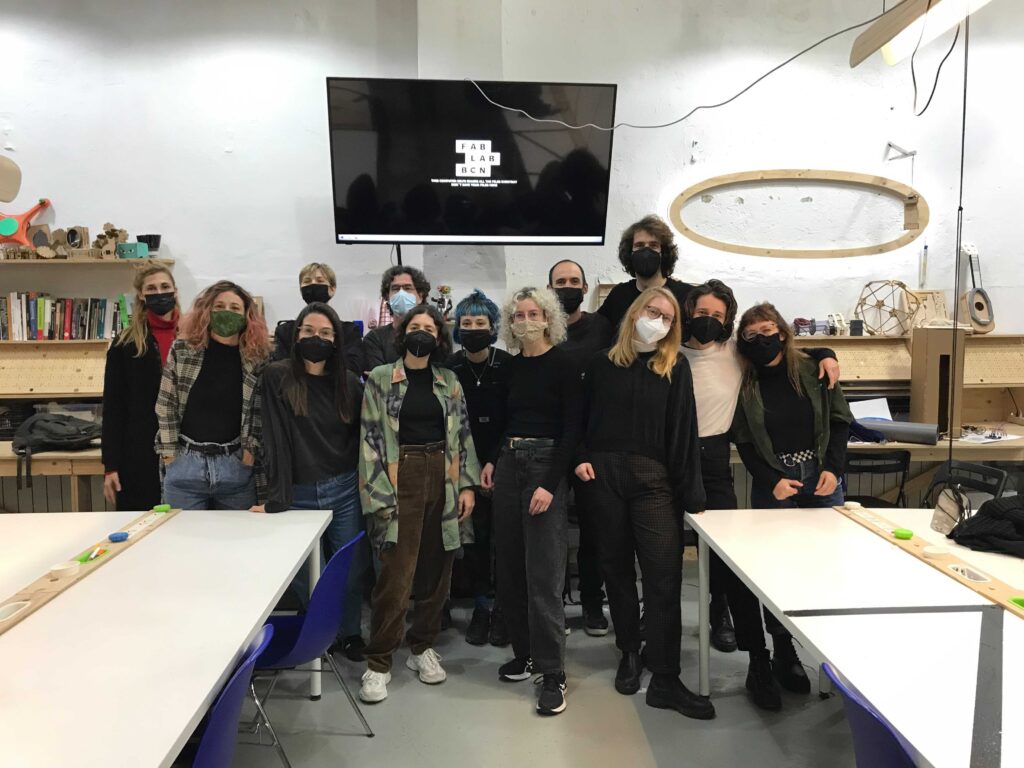
Thank you for following our quest to work towards sustainable and just futures. See you in 2022!
